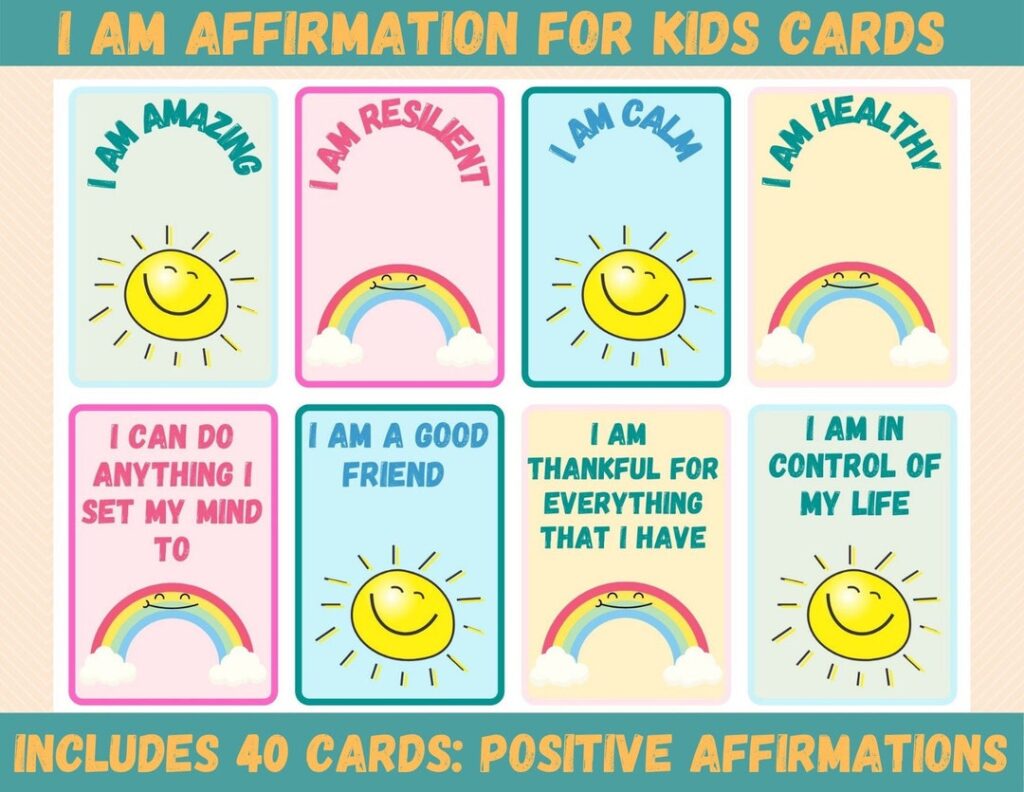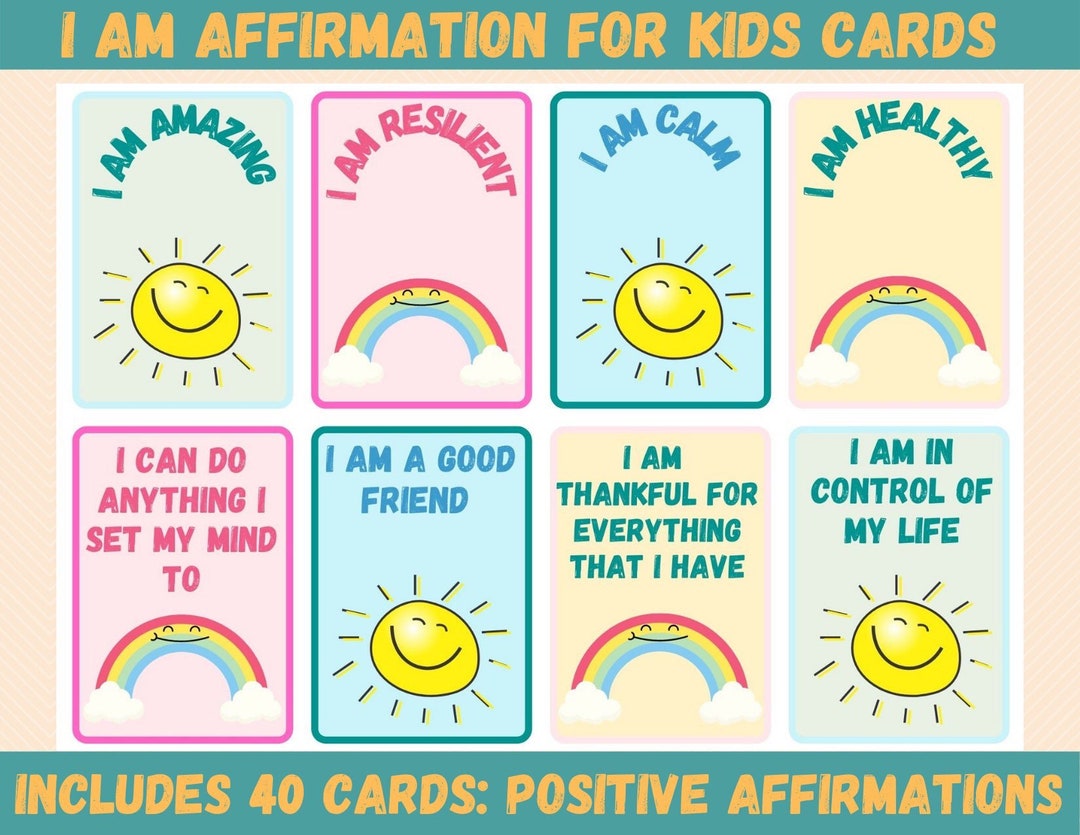
The Power of Words: Affirmations for Kids from Parents to Boost Confidence
In the realm of child development, the impact of parental influence is undeniable. Beyond providing basic necessities, parents shape their children’s self-esteem, resilience, and overall well-being. One powerful tool in a parent’s arsenal is the strategic use of words of affirmation for kids. These aren’t empty platitudes; they are carefully chosen phrases designed to instill confidence, validate emotions, and encourage positive self-perception. This article explores the profound benefits of words of affirmation for kids, offering practical examples and guidance for parents seeking to nurture their children’s emotional growth.
Understanding the Language of Love: Words of Affirmation
Gary Chapman’s groundbreaking book, *The 5 Love Languages*, introduced the concept that individuals express and receive love in different ways. One of these love languages is ‘Words of Affirmation.’ While often associated with romantic relationships, this concept is equally relevant to parent-child dynamics. Children who resonate with this love language thrive on verbal expressions of appreciation, encouragement, and affection. They feel valued and loved when their efforts are acknowledged and their positive qualities are highlighted. Using words of affirmation for kids is a powerful way to show your love and support.
Why Words Matter: The Psychological Impact
The words we hear, especially during childhood, have a lasting impact on our self-image and beliefs. Positive affirmations can counteract negative self-talk and build a strong foundation of self-worth. When parents consistently offer words of affirmation for kids, they are actively shaping their children’s internal dialogue. This positive reinforcement can lead to increased confidence, improved academic performance, and healthier relationships. Conversely, a lack of positive affirmation, or even worse, the presence of critical or negative language, can contribute to feelings of inadequacy, anxiety, and low self-esteem. [See also: Building Self-Esteem in Children]
Practical Examples: Affirmations for Different Situations
The key to effective words of affirmation for kids is sincerity and specificity. Generic compliments like “good job” are less impactful than specific praise that acknowledges effort and achievement. Here are some examples of affirmations tailored to different situations:
- Effort and Perseverance: “I’m so proud of how hard you worked on that project, even when it was challenging.” “I admire your determination to keep trying, even when things get tough.”
- Kindness and Empathy: “It was so kind of you to help your friend with their homework.” “I noticed how you comforted your sibling when they were upset. That was very thoughtful.”
- Creativity and Imagination: “I love how you used your imagination to create that story/drawing/game.” “You have such a unique way of looking at things.”
- Resilience and Problem-Solving: “I’m impressed with how you handled that difficult situation.” “You came up with a great solution to that problem.”
- Character and Values: “I appreciate your honesty and integrity.” “You are a very responsible and trustworthy person.”
Remember to tailor the words of affirmation for kids to your child’s individual strengths and personality. What resonates with one child may not resonate with another. Observe your child’s behavior and identify specific qualities you admire and appreciate. And most importantly, be genuine in your praise. Children can easily detect insincerity, which can undermine the positive impact of your words.
Beyond Compliments: Creating a Positive Environment
While specific words of affirmation for kids are essential, it’s equally important to create a generally positive and supportive environment. This includes:
- Active Listening: Pay attention when your child is speaking and show genuine interest in their thoughts and feelings.
- Validating Emotions: Acknowledge and validate your child’s emotions, even if you don’t understand them. Avoid dismissing their feelings with phrases like “don’t be sad” or “it’s not a big deal.”
- Positive Reinforcement: Focus on positive behaviors and accomplishments rather than dwelling on mistakes.
- Quality Time: Spend quality time with your child, engaging in activities they enjoy. This shows them that you value their company and are invested in their well-being.
- Modeling Positive Self-Talk: Be mindful of your own self-talk. Children learn by observing their parents, so it’s important to model positive self-perception.
Avoiding Pitfalls: What Not to Say
While words of affirmation for kids can be incredibly beneficial, it’s important to avoid certain phrases that can have a negative impact. These include:
- Conditional Praise: Avoid phrases like “I’ll be proud of you if…” This creates a sense of conditional love and can lead to performance anxiety.
- Comparing to Others: Never compare your child to siblings or peers. This can damage their self-esteem and create resentment.
- Sarcasm or Criticism: Avoid using sarcasm or criticism, even if it’s intended to be lighthearted. Children may not understand the nuance and may internalize the negative message.
- Empty Platitudes: Generic compliments like “you’re so smart” are less impactful than specific praise that acknowledges effort and achievement.
- Overly Critical Language: Avoid using harsh or judgmental language, even when disciplining your child. Focus on the behavior, not the person.
The Long-Term Benefits: Raising Confident and Resilient Children
The consistent use of words of affirmation for kids can have profound and lasting benefits. Children who feel valued and appreciated are more likely to develop:
- Increased Self-Esteem: They have a positive self-image and believe in their abilities.
- Improved Confidence: They are more likely to take risks and pursue their goals.
- Greater Resilience: They are better equipped to cope with challenges and setbacks.
- Healthier Relationships: They are able to form strong and healthy relationships based on mutual respect and appreciation.
- Positive Mental Health: They are less likely to experience anxiety, depression, and other mental health issues.
Integrating Affirmations into Daily Life
Making words of affirmation for kids a regular part of your parenting style doesn’t require grand gestures. Small, consistent efforts can have a significant impact. Here are some ideas for integrating affirmations into your daily routine:
- Morning Ritual: Start the day with a positive affirmation. Tell your child something you appreciate about them or something you’re looking forward to.
- Bedtime Routine: End the day with a positive affirmation. Tell your child how proud you are of their efforts or how much you love them.
- During Activities: Offer encouragement and praise during activities, whether it’s homework, sports, or creative pursuits.
- In Response to Challenges: Use affirmations to help your child cope with challenges and setbacks. Remind them of their strengths and abilities.
- Written Notes: Leave small notes with positive affirmations in their lunchbox, backpack, or on their pillow.
Remember that consistency is key. The more consistently you offer words of affirmation for kids, the more deeply they will internalize the positive messages. [See also: How to Communicate Effectively with Your Child]
Conclusion: The Enduring Legacy of Positive Words
Words of affirmation for kids are a powerful tool that parents can use to nurture their children’s emotional growth and well-being. By consistently offering specific, sincere praise and creating a positive and supportive environment, parents can help their children develop a strong sense of self-worth, confidence, and resilience. The enduring legacy of positive words will shape their children’s lives in profound and meaningful ways, empowering them to reach their full potential and lead happy, fulfilling lives. The impact of words of affirmation for kids extends far beyond childhood, creating a foundation for a lifetime of positive self-perception and healthy relationships. Make words of affirmation for kids a cornerstone of your parenting approach, and witness the transformative power of positive communication.

